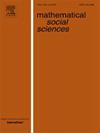符合性与名称动力学:古希腊名称的地理计量学研究
IF 0.7
4区 经济学
Q4 ECONOMICS
引用次数: 0
摘要
在命名从众的社会学研究的基础上,我们建立了一个反映从众或不从众行为的动态命名模型。这使我们能够考虑到比通常用于名称建模的统计物理方法更多的自由度。通过实证检验我们的模型,我们发现,从众命名解释了古希腊名字分布的独特形状,这与当代的名字数据不同。本文章由计算机程序翻译,如有差异,请以英文原文为准。
Conformism and name dynamics: A cliometric study of ancient Greek names
Extending the sociological study of conformism in naming, we develop a dynamic model of name choice, reflecting conformist or non-conformist behavior. This allows us to account for more degrees of freedom than the statistical physics approaches that have generally been used in name modeling. Testing our model empirically, we find that conformist naming accounts for the unique shape of name distributions in ancient Greece, which differs from contemporary name data.
求助全文
通过发布文献求助,成功后即可免费获取论文全文。
去求助
来源期刊

Mathematical Social Sciences
数学-数学跨学科应用
CiteScore
1.30
自引率
0.00%
发文量
55
审稿时长
59 days
期刊介绍:
The international, interdisciplinary journal Mathematical Social Sciences publishes original research articles, survey papers, short notes and book reviews. The journal emphasizes the unity of mathematical modelling in economics, psychology, political sciences, sociology and other social sciences.
Topics of particular interest include the fundamental aspects of choice, information, and preferences (decision science) and of interaction (game theory and economic theory), the measurement of utility, welfare and inequality, the formal theories of justice and implementation, voting rules, cooperative games, fair division, cost allocation, bargaining, matching, social networks, and evolutionary and other dynamics models.
Papers published by the journal are mathematically rigorous but no bounds, from above or from below, limits their technical level. All mathematical techniques may be used. The articles should be self-contained and readable by social scientists trained in mathematics.
 求助内容:
求助内容: 应助结果提醒方式:
应助结果提醒方式:


